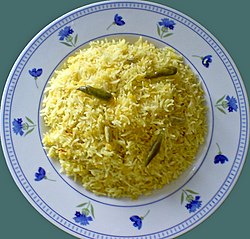Khichari

Khichdi
|
|
| Alternative names | Khichri, Khichadi, Khichdee, Khichadi, Khichuri (Bengali), Khechidi (Odia), Kisuri (Sylheti), Khichari, Kitcheree, Kitchree |
|---|---|
| Place of origin | Indian Subcontinent |
| Region or state | Bangladesh, India, Pakistan, Nepal |
| Main ingredients | Rice, lentils, spices |
| |
|
Khichdi (pronounced [ˈkʰɪtʃɽi]), or khichri, is a dish from the South Asia made from rice and lentils (dal). Khichdi was the inspiration for the Anglo-Indian dish kedgeree, and is also commonly considered to be the inspiration for the popular Egyptian dish, kushari. In Indian culture, it is considered one of the first solid foods that babies eat.
The term Khichdi (Khicṛī)(Urdu: کھچڑی) is derived from Sanskrit खिच्चा khiccā, a dish of rice and legumes.
Some divergence of transliteration may be noted in the third consonant in the word khicṛī. The sound is the retroflex flap [ɽ], which is written in Hindi with the Devanagari letter ड़, and in Urdu script with the Perso-Arabic letter ڑ.
In Hindi-Urdu phonology, the etymological origin of the retroflex flap was /ɖ/ when it occurred between vowels. Hence in Devanagari the letter ड, representing /ɖ/, was adapted to write /ɽ/ by adding a diacritic under it. In Urdu script, the phonological quality of the flap was represented by adapting the letter ر, representing /r/, with a diacritic added above it to indicate the retroflex quality.
...
Wikipedia
